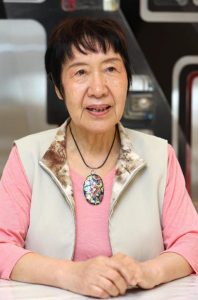Views on Ukraine invasion from A-bombed Hiroshima’s perspective: Toshiko Tanaka, 83, A-bomb survivor, Hiroshima
Apr. 26, 2022
Rather than force, diplomacy
by Kana Kobayashi, Staff Writer
A kindergarten absent any playing children, and a Ferris wheel standing still amid the ruins of an amusement park. Those are some of the images I witnessed when visiting the Chernobyl nuclear power plant in Ukraine in April 2012. The restricted area affected by the plant’s accident in 1986 was literally in ruins. I feel a sadness that transcends anger when I think of those who had to abandon their daily lives because of the nuclear accident having to once again face the same situation with Russia’s invasion. Any issues between the nations should be resolved not by force but by diplomatic efforts.
My visit to Ukraine was prompted by the accident at the Tokyo Electric Power Company’s Fukushima No. 1 (Daiichi) nuclear power plant. As an A-bomb survivor suffering from radiation’s health effects for decades since the atomic bombing, I was driven by a sense of crisis and a questioning about why nuclear accidents were being repeated. In the suburbs of the Ukraine capital of Kiev, where fierce battles are now being waged in the war, I met with people affected by the nuclear accident and shared with them my experience in the atomic bombing.
As those affected by the accident worked desperately to rebuild their lives, they sought information with great urgency about how radiation affects human health and about government compensation issues. I saw victims begging from passersby at a subway entrance. Now, in the suburbs of Kiev, remnants of civilian massacres continue to be discovered.
The current situation in Ukraine, in which civilians try desperately to escape or lose their lives, overlaps with that in Hiroshima 77 years ago. I was six years old at the time and experienced the atomic bombing on my way to school, at a location about 2.3 kilometers from the hypocenter. I suffered severe burns to my arms, head, and neck and hovered between life and death. When 12, I was diagnosed with an abnormal white blood cell count and suffered from mouth sores and extreme fatigue.
What is the value of wounding and taking the lives of civilians? The persistent back-and-forth in use of force will only accelerate the arms race and increase the risk of nuclear weapons’ use. That is clear when looking back on history, but the same situation is consistently being repeated. Russia’s invasion of Ukraine and its threats to use nuclear weapon reveal in a very real sense the human tendency to ultimately rely on force.
In my mission as a survivor, I have shared both in Japan and overseas my experience in the atomic bombing and had the chance to interact with young leaders of future generations. Nuclear weapons are unmistakably evil, with their potential to not only harm human health but also to destroy the world. Although nuclear nations know that, why is it that they cannot do away with such weapons? My efforts amount to a mere drop in the ocean. But I want to continue to call for a world free of nuclear weapons as an A-bomb survivor, in the hopes that history will not be repeated.
(Originally published on April 26, 2022)








